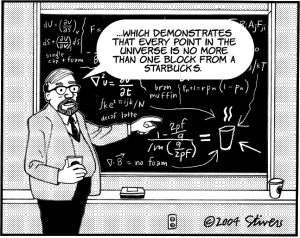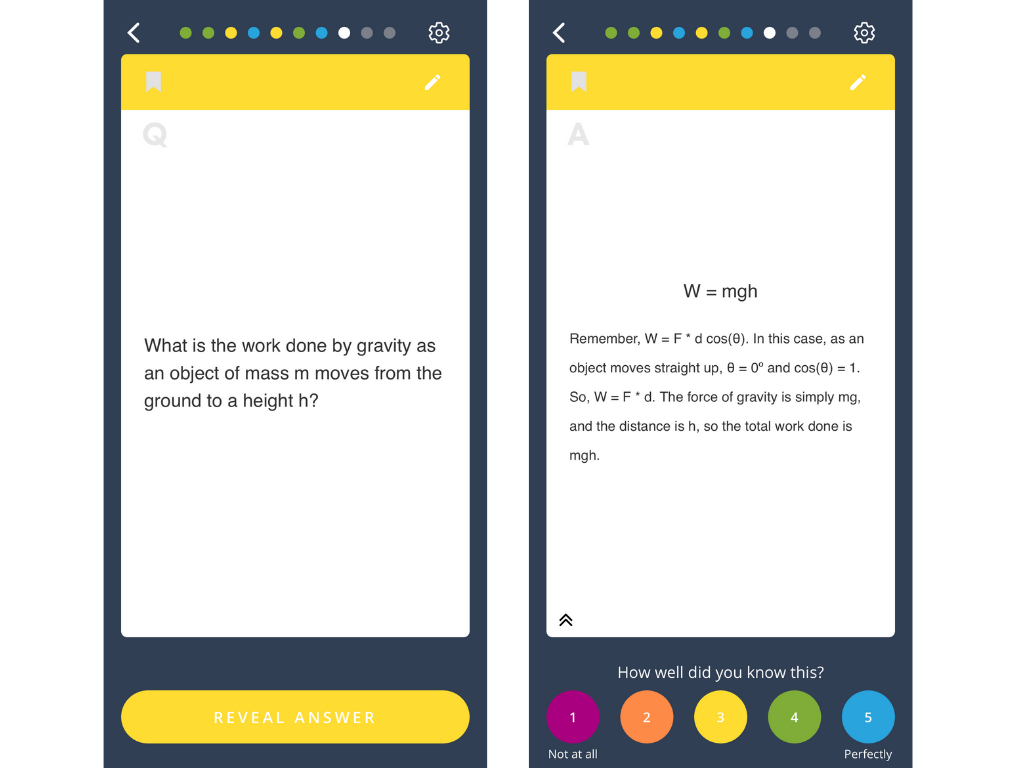When I was in college, I totally bombed first-year physics. Barely clawed through it in high school, too. And yet I ended up with an advanced science education (and pretty decent exam scores in physics along the way). How did I turn it around? It took a significant paradigm shift in the way I thought about and studied physics.
And that's exactly what I'm going to teach you about in this article: five killer strategies for understanding and learning physics so much better than you do. (I mean, I'm assuming physics has you on the ropes if you're here reading this.)
These strategies aren't just my own but are the product of decades of cognitive science research—yep, using science to help you learn science—as well as our many conversations with top students and professors in the realm of physics. So, with that said, here are five killer strategies for defeating my previous arch-nemesis science subject!
(Oh, and if you need help drilling yourself on the most important facts, Brainscape has expert-curated collections of smart, digital flashcards for AP Physics and Physics 101. We created these NGSS-compliant flashcards to help you master those crucial physics concepts as fast and painlessly as humanly possible, helping you crush that next test or exam!)
Tips on how to study physics effectively

1. Try to keep up and if you fall behind, prioritize recovery
Physics is one of those subjects—like maths—that scaffolds its knowledge outwards and upwards from a core foundation. If you miss just one piece of information, the structure can become shaky and unstable, which can make life hard for you all semester long.
As such, it's important to approach physics with the discipline to keep up with assigned readings, to practice problems regularly, and to review older content daily so that it doesn't fade from memory. Here are some powerful study tips for acing physics:
- Review the relevant textbook chapters ahead of class, writing down the most salient points so that your brain is primed to learn when you attend class, and so that you can actually use class time to pay attention and ask questions;
- Practice all the problem sets in the textbook, making sure you understand them on a conceptual level. Also, come back regularly to practice them (and any others you can get your hands on), or else you'll just forget;
- If you don't understand something, ask your professor, teacher, tutor, or smart nerd friend to help you. But don't wait until you're totally lost to do that. Address any knowledge gaps quickly or else any subsequent knowledge built upon that foundation (or lack thereof) will become shaky.
- Dedicate a little time every day to reviewing the content covered in previous lectures so that you don't forget it. Brainscape's study app will automate this review for you so all you have to do is make sure you get in 15-30 minutes of study every day.
These are just a few tips you can use to instantly improve your physics learning experience but for the full scoop, I really recommend you read 'How to study effectively: The ultimate guide.'
2. Drill yourself on the core concepts

After you've done your reading (in preparation for your next lecture), make sure you retain the concepts by drilling yourself on the main ideas, definitions, and formula you've encountered. Having these fundamental concepts memorized (or at least understood) before you go to your next lecture will really help you follow what's going on in class.
Now, Brainscape has been engineered to help students do exactly this kind of work by leveraging the power of spaced repetition for understanding and memorizing content. And you can use our pre-made certified collections of AP Physics and NGSS-compliant Physics 101 flashcards, or the flashcards made by other users, OR you can make your own for free!

Either way, Brainscape is the most efficient and effective way to learn and memorize the "building block" information that's so crucial for doing well in physics.
Interesting read: '6 Famous modern physicists you should know'
3. Brush up on your math

Sometimes the root of your physics problems—as was the case with me—lies in rusty or even non-existent math skills. And, unfortunately, the further you advance in physics the more you'll encounter mathematical processes you thought you'd long since left behind you. (Yeah, I'm talking about you, algebra, trigonometry, and calculus.)
You also can't expect the gaps to be filled within your lectures or class time because, very likely, your teacher or professor is going to assume you're proficient in all the math you need to cope with the content they're throwing at you. So, if you do struggle with math and it's tripping you up in physics class, don't hope for the problem to go away. Being the language of science, you can't afford to ignore rusty math skills.
Rather ask someone—a math-savvy friend, a fellow student, a math tutor, your professor, etc.—to run you through the particular math problems you're having so that you can return to your physics studies wholly proficient.
4. Think conceptually

Whether you’re searching for a unified field theory or studying the basic dynamics of force and motion, taking a conceptual approach to learning physics can help you break down your problem into a series of basic steps. Focus on the fundamentals, but keep the big picture in the back of your mind. Bringing together concepts into a unified understanding of the problem at hand makes finding a solution much easier.
Here's a great example: 'Baseball: the physics of hitting a fastball'
Remember, knowledge in physics is built on a series of conceptual stepping stones—the fundamental principles and laws of the universe—that allow exploration of a huge range of topics. Success depends on a firm knowledge of these basics, and a flexible mind that can assess these rules and determine when and how to apply them to a given problem.
So, stop beating your head against the wall, and instead use conceptual building blocks to breakthrough. And if you get snagged, work backwards to determine where you went astray.
P.S. Do you know these four fundamental physics concepts?
5. Get in the (study) zone

Like many subjects, but perhaps particularly those you're having difficulty with, a mastery of physics requires uninterrupted daily studying. What this means is different for everyone: some people work best in a busy coffee shop, while others need absolute silence and isolation.
Figure out how and where you get your best studying done and work that into a daily routine so that you can spend a little time every day (1) reviewing what you learned that day (and the day before), (2) consolidating your study notes, (3) running through some sample problem sets, and (4) preparing for the next class.
For our seminal study guide on how to achieve maximum study focus, check out: '‘I can’t concentrate!’ How to focus better when studying.'
A final note: Know that physics can be easy if you stay on track

Physics may appear to be cloaked in all kinds of complex formulae, equations, theorems, and laws but at its core: physics makes sense. More than that, it actually helps you understand why stuff happens, affording you a detailed glimpse into how things fundamentally work at the level of molecules, sub-atomic particles, and sub-sub-atomic particles.
What this means is that physics can be easy if you stay on track, and this is the mindset you might try to apply when you're learning this subject.
My biggest handicap when walking into my first-ever lecture of first-year physics was believing I couldn't understand it. I just had to somehow rote memorize the facts and pray to the Gods of Pythagoras that I'd pass on memorized knowledge alone. But physics doesn't work that way, as you now well know.
So, if you implement the five strategies we've covered in this guide, you'll find yourself learning more efficiently, effectively targeting your weaknesses, and maybe even enjoying physics a whole lot more! And don't forget to make the most of Brainscape as you rise to the challenge of this exciting and challenging science subject!
